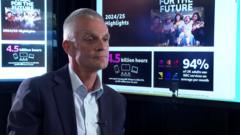Is the BBC Boss Ready to Take a Stand Amid Controversies?

A Close Look at Tim Davie's Leadership Under Pressure
In recent weeks, Tim Davie's leadership at the BBC has faced unprecedented scrutiny, and today, we witnessed firsthand the ramifications of that pressure. Known for his polished demeanor and articulate responses, Davie appeared visibly shaken during a press interaction that highlighted the challenges he currently grapples with. Though he assured that resignation had not crossed his mind, he candidly acknowledged the period as "a very, very tough time." This article delves into the recent controversies surrounding the BBC under Davie's stewardship, his responses to these challenges, and the implications for the future of the organization.
The Context of Current Challenges
The BBC has historically been a bastion of journalism and public service broadcasting, but recent events have tested its integrity and the mettle of its leadership. Various controversies have emerged, including:
- The contentious Gaza documentary featuring a child narrator linked to a Hamas official.
- The withdrawal of a film about doctors in Gaza just before its scheduled transmission.
- Issues surrounding the livestream of the punk duo Bob Vylan's performance at Glastonbury.
- The termination of John Torode's contract as the MasterChef presenter amidst growing public debate.
These incidents have put Davie's leadership under the microscope, leading to public outcry and calls for accountability. Most notably, the culture secretary labeled the situation as a "series of catastrophic failures," a statement that reverberates through the corridors of the BBC.
Davie's Response to Crisis
In light of the recent controversies, Davie launched the BBC's annual report via Zoom, allowing journalists to pose questions remotely. However, the absence of in-person interactions raised eyebrows. It was a significant day for the BBC, and the choice to keep senior executives away from the cameras seemed either a strategic misstep or a sign of vulnerability.
Hours later, Davie opted for a face-to-face interview, a move that signaled a shift in his approach to communication during this crisis. While he has always encouraged open dialogue and accountability, today’s interview revealed a more human side to his leadership. Davie’s usual composure faltered at times, with some responses sounding somewhat rehearsed, yet he expressed genuine frustration, stating plainly, "I felt pressure."
The Impact of Public Scrutiny
The ongoing public debate surrounding leaders in crisis, like the recent emotional moments from Rachel Reeves in the Commons, raises an important question: What impact does intense scrutiny have on public figures? For Davie, the scrutiny has not only affected him professionally but personally as well. The weight of leadership during turbulent times can be isolating, and the burden of public service can take a toll on one’s emotional well-being.
As he navigates through these challenges, it is essential to consider the human side of leadership. While public figures are often expected to maintain an unwavering facade, the reality is that they, too, experience stress and frustration. Davie’s recent display of vulnerability may resonate with the public in a way that strengthens the connection between the leadership and the audience they serve.
Signaling Change: The BBC's Commitment to Accountability
In the wake of the controversies, the BBC appears to be taking steps to address workplace behavior and accountability. The chairman, Samir Shah, made it clear that changes were forthcoming after the scandal involving Huw Edwards. Recent developments include:
- Termination of contracts for prominent figures, including Gregg Wallace and John Torode.
- Three staff members being asked to "step back" from their roles following the Glastonbury event.
- Reports of multiple individuals being sacked as a result of the BBC's culture review.
This decisive action sends a strong message: the BBC, under Davie's leadership, is committed to improving its workplace culture and holding individuals accountable for their actions. The phrase "Teflon Tim," once used to describe Davie's ability to deflect criticism, may be evolving as he embraces a more transparent and responsive leadership style.
Lessons for Leadership in Public Service
The challenges faced by Tim Davie and the BBC offer valuable lessons for leaders in all sectors, particularly in public service. Here are some key takeaways:
1. Embrace Transparency
In times of crisis, transparency can foster trust between leadership and the public. Leaders who communicate openly about challenges and decisions can reduce speculation and build confidence in their capabilities.
2. Recognize the Human Element
Public figures are not immune to emotional strain. Acknowledging the pressures of leadership can humanize leaders, making them more relatable to the public they serve.
3. Act Decisively
Inaction can lead to further erosion of trust. Leaders must be willing to make tough decisions, even if they are unpopular, to demonstrate accountability and commitment to organizational values.
4. Foster a Culture of Accountability
Establishing clear expectations for behavior and performance within an organization can prevent scandals and foster a healthier work environment. Leaders must actively promote a culture of accountability at all levels.
The Road Ahead for Tim Davie and the BBC
As Tim Davie continues to navigate the turbulent waters of leadership at the BBC, the path forward is fraught with challenges. With recent controversies weighing heavily on public perception, he must find a way to restore confidence and reinforce the BBC's commitment to its values. The steps taken thus far signal a willingness to confront issues head-on, but the effectiveness of these measures will ultimately depend on how they are implemented and perceived by the public.
For Davie, it is crucial to remember that resilience in leadership is not just about surviving crises but learning from them. The BBC's future will depend on its ability to adapt, evolve, and regain the trust of its audience while maintaining its core mission of public service broadcasting.
Conclusion
As we reflect on the recent events surrounding Tim Davie and the BBC, we are left with a profound understanding of the complexities of leadership in public service. While challenges may arise, the way leaders respond can either fortify their position or lead to further scrutiny. The journey is ongoing, and the coming months will be pivotal for both Davie and the BBC. Will they emerge stronger from these challenges, or will the weight of public expectations prove too great?
FAQs
What challenges has Tim Davie faced as the BBC director general?
Tim Davie has faced multiple challenges, including controversies surrounding documentaries, personnel decisions, and public criticism from government officials.
How has the BBC responded to recent controversies?
The BBC has taken steps to address workplace behavior and accountability by terminating contracts of certain individuals and conducting a culture review.
What impact does public scrutiny have on leaders?
Public scrutiny can create emotional and psychological pressure on leaders, affecting their performance and decision-making abilities.
As Tim Davie continues to steer the BBC through these turbulent waters, how do you see the future of public service broadcasting evolving? #Leadership #BBC #PublicService
Published: 2025-07-15 20:52:09 | Category: technology



